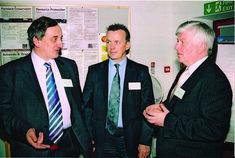
The rising importance of procuring home grown produce for public institutions was reflected by an enthusiastic audience at a recent conference in the north east.
Fourteen Yorkshire, Humberside and Lincolnshire councils, represented by 35 senior councilors, were among 70 delegates at Stockbridge Technology Centre at the end of March.
Host John Grogan, the local MP for Selby, said the aim of the conference was to inform councillors of the government’s commitment to improve food quality and reduce food miles for schools and hospitals purchasing.
He said the region had the largest concentration of food and drink businesses in the UK and 12 percent growth was expected over the next 10 years.
The impetus to move into public sourcing of home grown food, started in the Bradford area four years ago, followed the government’s pressure to improve the quality of foods and produce, particularly to schools and hospitals.
Meurig Raymond, NFU deputy president, said that for producers, public procurement was a key issue. According to Defra, the size of the market open to them is a substantial £2 billion, of which more than half was spent by the education sector.
He said he wanted to acknowledge the work undertaken by the NFU through Michael Holmes. ”He has worked tirelessly to get good local food into schools, particularly in the Bradford area and his appointment on the government’s Schools Food Trust means he can continue that work at a national level,” he said.
Raymond added that he welcomed the recent decision by the Secretary of State to commission work that would determine the proportion of publicly procured food which was British. The results, due in October, are set to provide a more accurate picture of what the situation is, and then concentrate the minds of what actions home producers could take.
“But in addition to this I think we need a clear understanding of what the benefits of supplying local food to schools and hospitals are for producers, procurers and for the government’s own policy goals,” said Raymond.
Roger Sheard, operations manager for Education Contract Services for the City of Bradford, said that buying locally was firstly good business.
He added that it differentiated them from their competitors, improved farm to plate quality, supported schools in terms of added value and curriculum links, and was also politically acceptable in terms of sustainable economic regeneration, consumer awareness and reduced waste.
Roger Sheard said there were definite advantages in local procurement in local government, not least in the areas of managing risk, creating new markets and delivering the Public Sector Food Procurement Initiative.
But he added that it was important to remove obstacles, particularly to support initiatives so that smaller producers could become involved
“Also it is very important to establish partnerships between councils and suppliers,” said Sheard.



